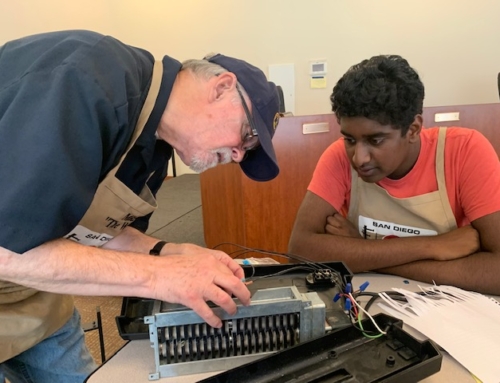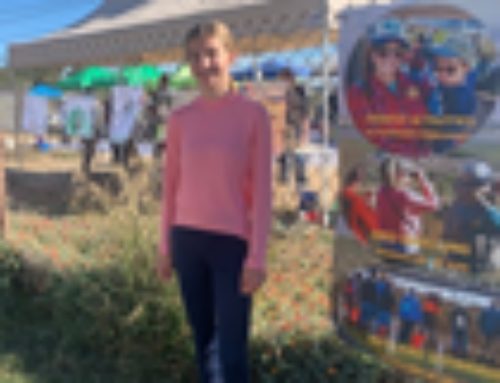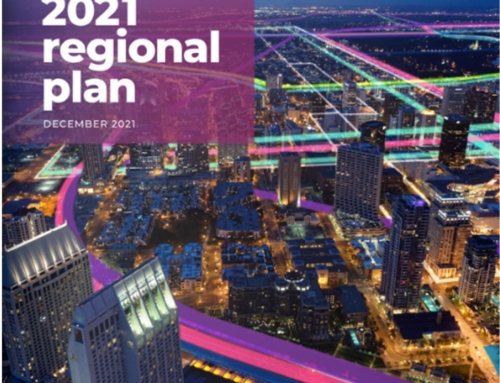Last year was both challenging and exciting for STAY COOL. In early 2018 we partnered with San Diego Audubon Society (SDAS), which now serves as our fiscal sponsor. We thank SDAS for their ongoing support and partnership as we head into 2019. You may also recall that STAY COOL transitioned into a volunteer-managed organization at the end of 2017. As a result, our Advisory Council members have stepped up to take on more leadership and responsibility to carry out the STAY COOL mission.
In 2018, we said goodbye to Marty Eberhardt, one of our founding members, but at the same time we welcomed Linda Pratt to our Advisory Council team. Linda brings a wealth of knowledge about climate policies. For more than 30 years she built a successful career focused on community-based environmental protection, serving as the director of regional environmental programs for the City and County of San Diego, and most recently as the managing director of a statewide nonprofit organization, Green Cities California.
Our newest Advisory Council member is Tracy Delaney, PhD, RD, who is the founding director of the Public Health Alliance of Southern California – a regional coalition of nine local health departments whose members have statutory responsibility for the health of 60% of California’s population. Her work advances population health and equity through multi-sector initiatives addressing policy, systems and environmental change.
STAY COOL membership remains around 250, with many members playing important roles in other climate change action groups in our community.
We also have a growing audience of Facebook followers. In addition, Advisor Dennis Griffin started his “DIY Climate Action” group on Facebook with practical advice on how you can be climate-smart at home and in your daily life.

Under the leadership of Sue Randerson, Laura Schumacher (both pictured) and David Engel, we brought our Ocean Climate Science education program to more than 170 new students at Standley Middle School in University City. During two days of lessons to five classes, Scripps Institution of Oceanography (SIO) grad students partnered with STAY COOL elders to explain how adding CO2 to the atmosphere by burning fossil fuels is making oceans warmer and more acidic. This year, STAY COOL continues to offer our youth Ocean Climate Science program, targeting middle schools and 6th grade class levels.
We have continued to hold membership events throughout the year. For example, in June, we heard from Dr. Mark Merrifield who is the first director of the Center for Climate Change Impacts and Adaptation (CCCIA) at Scripps Institution of Oceanography. Another popular membership event was a guided walk through the Silverwood Wildlife Sanctuary, a 785-acre open space preserve near Lakeside owned and maintained by San Diego Audubon.
In November we honored our newest Grandkids’ Climate Defender and had the pleasure of hearing from Dr. “Ram” Ramanathan. Also, in attendance was Dr Ram’s wife Giri and grandson Ayan. Ram’s message was clear and direct – we all must do everything we can to prevent the worst from happening to our children and grandkids, and indeed to all lifeforms. We agree that more effort must now be spent on adaptation strategies, and in planning how to remove CO2 from the atmosphere. Grassroots, bottom-up efforts may be our last, best opportunity. STAY COOL is deeply appreciative to have heard Ram’s inspirational thoughts, along with his grandson Ayan who encouraged more recycling, bicycling and walking.

Dr. “Ram” Ramanathan honored as STAY COOL’s Climate Defender 2018, pictured here with Sarah Benson, Bob Leiter, David Engel and grandson Ayan.
We co-sponsored the Climate Summit that was organized by Climate Science Alliance and SIO in March. Advisor Bob Leiter was later invited to serve on two peer review panels for California’s Fourth Climate Change Assessment, including the San Diego Region Report, a first-of-its kind detailed assessment of the climate change risks that threaten our own region. Relying on key findings from the San Diego Region Report, we’re now working with other NGOs and academic institutions to help design an effective planning framework for coping with increased wildfire risks and other natural hazards in the context of integrated regional water resource planning.
We have also been very active in climate policy and advocacy during 2018. We continued our efforts to encourage the County of San Diego to adopt an aggressive Climate Action Plan, including letters and testimony at the County Planning Commission and County Board of Supervisors.
In March, we joined with several other regional and statewide advocacy groups to testify before the California Air Resources Board (CARB) in support of ambitious 2035 Greenhouse Gas (GHG) reduction targets for the San Diego region. Since that time, we have been meeting with SANDAG staff to promote specific climate-smart strategies for inclusion in the 2019 Regional Plan Update, as summarized in a letter we submitted to them in October:
In 2019, STAY COOL will be continuing its efforts on these fronts and continuing to advocate for Community Choice Aggregation (CCA) to reduce the carbon footprint of our electricity. We will also be pursuing some new ideas and collaborations with other like-mined groups in the areas of climate education and advocacy. We want your active involvement to advance our mission of lessening the impact of climate change so that our children and grandchildren—and generations to come—can thrive.



